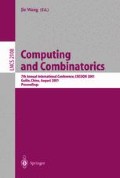Abstract
A language is universally polynomial if its intersection with every NP-complete language is in P. Such a language would provide an automatic method for generating easy instances of intractable problems. In this note, we give a complete characterization of universally polynomial languages that are context-free, answering an open question in [4].
This research is partially supported by an SCU-IBM Faculty Research Grant.
Access this chapter
Tax calculation will be finalised at checkout
Purchases are for personal use only
Preview
Unable to display preview. Download preview PDF.
References
Balcézar, J.L., Díaz, J., and Gabarró, J. Structural Complexity I, vol. 11 of EATCS Monographs on Theoretical Computer Science. Springer-Verlag, 1988.
Berman, L., and Hartmanis, J. On isomorphisms and density of NP and other complete sets. SIAM J. Comput. 6 (1977), 305–322.
Bodlaender, H.L., Kloks, T., Tan, R.B., AND van Leeuwen, J. λ-coloring of graphs. In Proceedings of the 17thAnnual Symposium on Theoretical Aspects of Computer Science (2000), pp. 395–406.
Demaine, E.D., Lopez-Ortiz, A., AND Munro, J.I. On universally easy classes for NP-complete problems. In Proceedings of the 12thAnnual ACM-SIAM Symposium on Discrete Algorithms (2001), pp. 910–911.
Garey, M.R., AND Johnson, D.S. Computers and Intractability: A Guide to the Theory of NP-completeness. Freeman, 1979.
Hopcroft, J., AND Ullman, J. Introduction to Automata Theory, Languages, and Computation. Addison-Wesley, Reading, Mass., 1979.
Ibarra, O., AND Ravikumar, B. On sparseness, ambiguity and other decision problems for acceptors and transducers. In Proceedings of the 3rd Annual Symposium on Theoretical Aspects of Computer Science (1986), pp. 171–179.
Latteux, M., AND Thierrrin, G. On bounded context-free languages. Elektron. Informtionsverarb. Kybernet. 20 (1984), 3–8.
Author information
Authors and Affiliations
Editor information
Editors and Affiliations
Rights and permissions
Copyright information
© 2001 Springer-Verlag Berlin Heidelberg
About this paper
Cite this paper
Tran, N. (2001). On Universally Polynomial Context-Free Languages. In: Wang, J. (eds) Computing and Combinatorics. COCOON 2001. Lecture Notes in Computer Science, vol 2108. Springer, Berlin, Heidelberg. https://doi.org/10.1007/3-540-44679-6_3
Download citation
DOI: https://doi.org/10.1007/3-540-44679-6_3
Published:
Publisher Name: Springer, Berlin, Heidelberg
Print ISBN: 978-3-540-42494-9
Online ISBN: 978-3-540-44679-8
eBook Packages: Springer Book Archive

